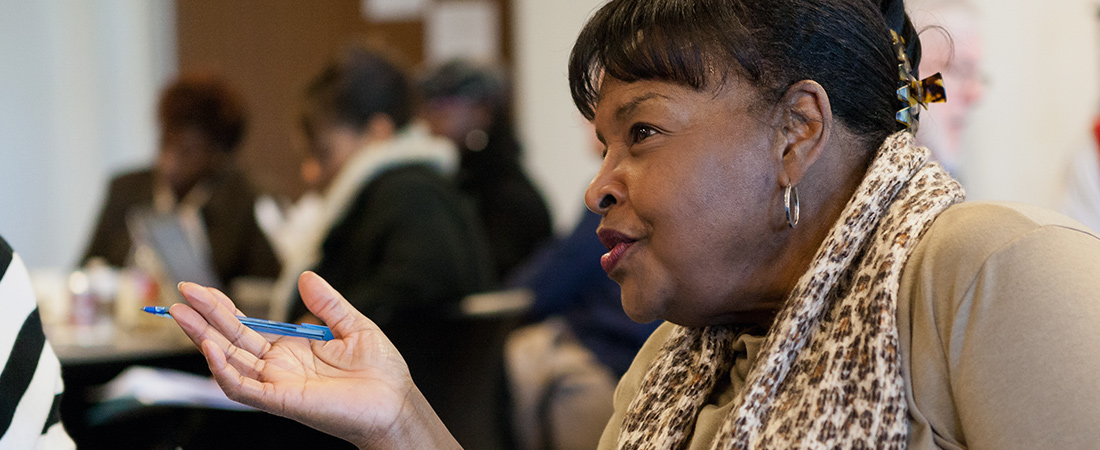Harnessing Principal Power

During a recent workshop, Cheryl King talks with school leaders about improving urban schools.
How much can education change a life? Ask Cheryl King.
“My parents were of modest income, but it was important to them that I be educated with kids whose parents could afford the best schooling experiences,” she says. “I learned to read, write, and think with kids who were affluent and expected to succeed.”
These early experiences shaped King’s outlook on the power of high-quality education to lift people out of poverty. That’s why, upon graduation from college, she rejected an offer to teach in an affluent, predominantly white elementary school in Grand Rapids and, instead, requested an assignment in one of the highest-need, lowest-performing middle schools in the heart of the city.
“I believed that I was uniquely prepared to share the lessons I learned about the influence of privileged schooling in the lives of poor kids,” says King. “From day one, I knew that it was my unique calling to create the highest quality learning experiences possible for my students.”
It’s a calling King still hears. After working as a teacher, principal, and central office administrator, she has spent the last decade supporting efforts to improve principal preparation and retention in chronically underperforming schools.
Preparing for complex challenges
So why this focus? For one thing, studies show that half of all principals in chronically underperforming schools leave before the end of their third year due to difficult working conditions. That turnover has negative effects on both teacher retention and student learning outcomes. In addition, research has shown that the role of principal is second only to the role of teacher in influencing student performance.
“The importance of principal preparation in turning around chronically low-performing schools cannot be overstated." –Cheryl King
In short, there’s a connection between principals who know how to support effective teaching and learning in their schools and high-performing teachers and students.
“The importance of principal preparation in turning around chronically low-performing schools cannot be overstated,” says King.
But preparing principals who are ready to address the complex challenges facing these schools is a serious challenge. Traditional courses with a primary focus on scholarship and theory are simply not enough. Effective principals report the need for clinically supervised internships that allow them to grapple with real problems, in real schools.
King’s current work supports the redesign of principal preparation in training programs across the country, an effort funded by The Wallace Foundation. At the core of her work is a renewed emphasis on rethinking the internship experience, developing partnerships between universities and K–12 school districts, and establishing communities of practice. The working hypothesis is that effective principals are developed, not born, and that effective training is a key predictor of future performance.
King is encouraged by early results that suggest transformation is underway, and that schools are benefiting from this work.
“We are seeing dramatic shifts in program emphasis across the country,” she says. “Programs are increasingly taking responsibility for tracking their principals post-training. They are also adjusting practices to improve performance outcomes. The desired result is high-quality leadership that allows all students access to a privileged learning experience.”
